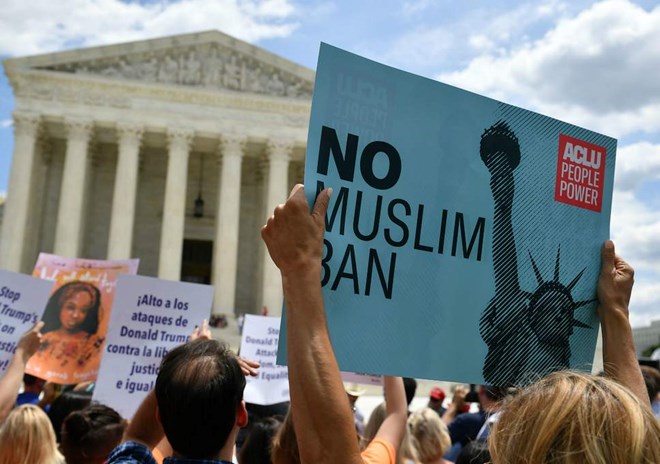
Wednesday June 27, 2018

The US Supreme Court has Donald Trump’s travel ban which severely limits travellers from certain countries entering the US.
As it stands, travellers, immigrants, and visa holders from Iran, Libya, North Korea, Somalia, Syria, Venezuela, and Yemen are banned from coming into the US.
All through his campaign in 2016, Mr Trump had called for a “total and complete shutdown” any Muslims entering the US "until our country's representatives can figure out what is going on”.
What was the first travel ban?
On 27 January 2017 Mr Trump signed an executive order banning entry into the country for 90 days for travellers from seven majority-Muslim countries: Iraq, Syria, Iran, Libya, Somalia, Sudan and Yemen.
It also placed an indefinite hold on refugees fleeing the Syrian conflict and a four month-hold on refugees from anywhere else in the world.
The ban he signed had also called for an end to the Visa Interview Waiver programme, which eliminated the need for an in-person interview to renew travel credentials for people from 38 countries, some US allies.
The first iteration of the travel ban - also known which critics called a "Muslim ban" - sparked massive public protests in nearly every airport around the whole country and mobilised legal and immigrants’ rights groups into action.
Was it challenged?
In the days following the initial ban, courts in New York and Massachusetts issued temporary blocks on the order. Stating that if a traveller had a legal right to enter the country with a visa then they could not be denied or removed from the US.
The backlash was felt by then-Acting Attorney General Sally Yates who was fired for refusing to defend the order publicly.
In February 2017, the Ninth Circuit Court of Appeals in San Francisco then ruled against reinstating the ban after both the administration and activist groups filed petitions.
But there was another ban issued?
In March 2017, a revised travel ban was issued by the Trump administration, authored by White House aide Stephen Miller.
After uproar from the US military and veteran community, Mr Trump removed Iraq from the travel ban list. Advocates said it was unfair to block translators and interpreters who assisted and fought alongside US troops during the Iraq War from coming to the US.
However, Iran, Libya, Somalia, Sudan, Syria and Yemen remained on the list for the 90-day ban and refugees were banned for 120 days.
What happened in Hawaii?
The revised ban was set to take effect on 16 March 2017, but just hours before that deadline, a federal judge in Hawaii placed a temporary, nationwide block on implementing the ban.
Mr Trump called it “unprecedented judicial overreach”. A federal judge in Maryland and the judge in Hawaii both cited Mr Trump’s anti-immigration remarks during his campaign as evidence to suggest it amounted to a “Muslim ban”.
The administration pushed back once again and an appeal was heard in the 4th Circuit Court of Appeals, which ultimately ruled that the revised ban "continues to exhibit a primarily religious anti-Muslim objective”.
The US Supreme Court intervenes
The case was appealed up to the highest court in the country in June 2017. It upheld part of the ban and stated that travellers had to cite a “bona fide” relationship with a “close” US relative and defined those family relationships as parent, spouse, child, adult son or daughter, son-in-law, daughter-in-law or sibling. Grandparents were not included.
Mr Trump continued his Twitter push to say the ban was a matter “safety” for Americans and called the revised ban a “watered-down, politically correct” version.
The third, current version is issued
Appearing to address the religious discrimination legal concerns, the Trump administration added North Korea and Venezuela to the list. It removed Chad after, once again, the military likely expressed concerns. The African nation has been a staunch ally of the US in counter-terrorism efforts on the continent.
People with work visas from certain countries were also excluded from the ban.